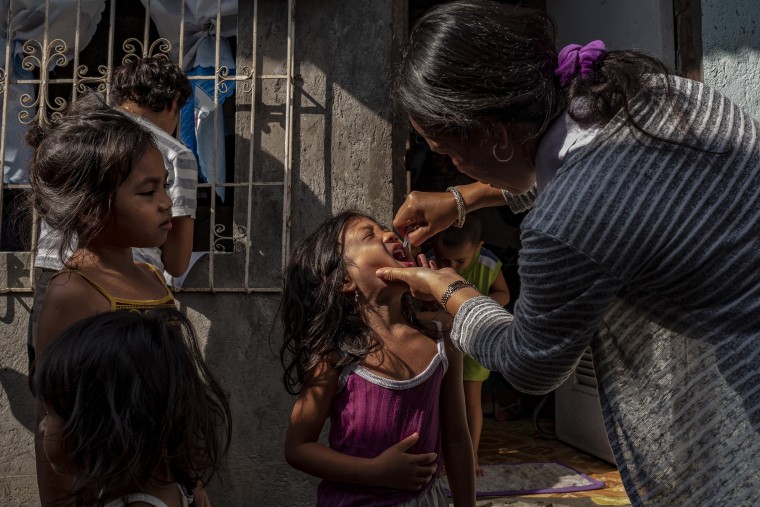If President Donald Trump carries out his threat to pull American funding for the World Health Organization, the impact on polio eradication efforts around the world could be “catastrophic,” experts told NBC News on Wednesday.
“It’s heartbreaking,” said Dr. Jack Chow, 59, the former assistant director-general at the WHO, where he was responsible for combating HIV/Aids, tuberculosis and malaria.
Chow, who previously served as the State Department’s special representative on global HIV/AIDS under Secretary of State Colin Powell, added the move was a "torpedo" that could “potentially sink” the United Nations’ agency responsible for international public health, which was founded in 1948.
Trump announced Tuesday he was halting U.S. funding for the WHO, pending a review of its response to the initial coronavirus outbreak, after officials at the organization criticized his restrictions on travel from China that took effect i early February.
Trump accused the organization of "severely mismanaging and covering up" the coronavirus crisis, specifically the initial outbreak in Wuhan, China, saying: "With the outbreak of the COVID-19 pandemic, we have deep concerns about whether America's generosity has been put to the best use possible. The reality is that the WHO failed to adequately obtain and share information in a timely and transparent fashion.”
The move was met with severe criticism at home and abroad, with U.N. Secretary-General António Guterres saying "now is not the time" for such a drastic move with the globe gripped by the the pandemic.
U.S. contributions to the WHO are divided into the kind of regular subscription payments made by all U.N. members, according to their size and ability to pay, and voluntary payments made to specific programs that combat diseases, like polio — a centuries-old scourge that debilitates the limbs and damages the brains of children.
In 1952, many American parents, terrified of polio’s devastating impact, kept their children indoors for months as more than 3,000 people died that year alone and thousands more were left with mild to disabling paralysis.
Three years later, a vaccine that neutralized polio’s harmful effects was developed by Jonas Salk, a physician and scientist at the University of Pittsburgh, and countries around the world began widescale vaccination efforts. American funding has also financed programs in multiple countries. An oral vaccine was later developed by his fellow researcher, Dr. Albert Sabin.
“The American government and U.S. citizens have been the most ardent supporters of polio eradication, because they still remember the devastation of polio in their own country,” said Dr. Hamid Jafari, the WHO's director for polio eradication in the eastern Mediterranean region.
At pains to point out the bipartisan support for this funding, he added that "people have had relatives, uncles, grandparents who were affected by polio.”
In the 1980s, the CDC teamed up with the WHO to launch an effort to eradicate polio globally, sending epidemiologists into the field in dozens of different countries at a time when the virus still infecting and paralyzing hundreds of children worldwide every day.
But after several decades and hundreds of millions of dollars in U.S. funding, that mission is now very nearly accomplished, with just a handful of wild polio outbreaks still surfacing in Pakistan and Afghanistan, and roughly 10 sub-Saharan countries facing sporadic outbreaks of a vaccine-derived version of the disease.
Jafari, who worked for the CDC for 27 years before joining WHO, is a senior official at the Global Polio Eradication Effort — a collaborative program involving six partner organizations, including the WHO, which costs almost $1 billion a year and relies primarily on voluntary contributions from governments.
Roughly a third of its current funding come from the U.S. and he said he was concerned about the implications of so significant a shortfall.
“The program will lose some ground when we stop vaccinating children, particularly in infected areas,” he said.
Chow added that if he had interpreted Trump’s comments correctly, an extra $215 million for polio eradication efforts could also now be withheld.
He said the implications were dire, not just for young children in Pakistan, but for fragile health care systems across the world ranging from HIV patients in Africa to women’s health in Southeast Asia.
“If you’re the sole provider of a vital service, and then you take it away, that’s catastrophic,” he said.
CORRECTION (April 15, 2020, 6 p.m. ET): A previous version of this article misstated the professional affiliation of Hamid Jafari. He is the WHO's director for polio eradication in the eastern Mediterranean region; he is no longer with the CDC.
